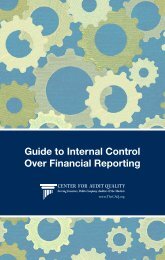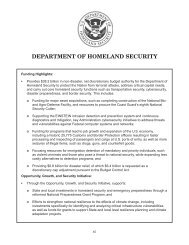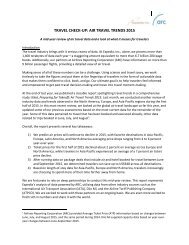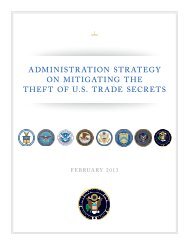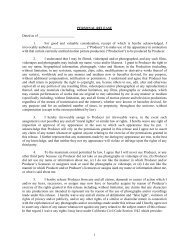A-HRC-13-42
You also want an ePaper? Increase the reach of your titles
YUMPU automatically turns print PDFs into web optimized ePapers that Google loves.
A/<strong>HRC</strong>/<strong>13</strong>/<strong>42</strong><br />
page 16<br />
22. Opinion No. 29/2006 of the Working Group on Arbitrary Detention 16 concerned 26<br />
individuals who were alleged to have been captured in various countries, partly handed over into<br />
the custody of the United States of America under its secret Central Intelligence Agency (CIA)<br />
rendition programme in the context of the so called “global war on terror”. They were held<br />
incommunicado at various “black sites” under the jurisdiction of the United States for prolonged<br />
periods of time, without charge or trial, access to courts of law, and without their families being<br />
informed or aware of their fate or whereabouts. In spite of the absence of a response by the<br />
Government of the United States to these allegations, the Working Group considered itself in a<br />
position to render an opinion on the cases of these 26 individuals, many of whom were suspected<br />
of having been involved in serious crimes, and held that their detention clearly fell within<br />
category I of arbitrary detention.<br />
23. In most cases, secret detention, as it is outside any international or national legal regime,<br />
also implies that the duration of detention is not known to the detainee; it rests at the sole<br />
discretion of the authorities ordering the detention. Hence, the very nature of secret detention<br />
may result in potentially, or actually, indefinite periods of detention, which render this type of<br />
detention arbitrary on this additional ground. 17<br />
2. Secret detention and the right to a fair trial<br />
24. Secret detention outside the protection of the law is often resorted to with the purpose of<br />
depriving the detainee of the rights that he or she would otherwise enjoy as a person charged<br />
with a criminal offence, namely the right to a fair trial, as enunciated in article 14 of the<br />
International Covenant on Civil and Political Rights and the complementary guarantees<br />
contained in article 9, paragraphs 2 and 3. Article 9, paragraph 2 of the Covenant stipulates that<br />
anyone who is arrested should be promptly informed of any charges against him. Paragraph 3 of<br />
the same article requires that anyone arrested or detained on a criminal charge be brought<br />
promptly before a judge or other officer authorized by law to exercise judicial power.<br />
25. The above-mentioned provisions presuppose that anyone suspected of having committed a<br />
recognizable criminal offence and arrested on these grounds must be informed of the underlying<br />
charges if the interest of justice requires the prosecution of such a crime; otherwise, the State<br />
could circumvent the additional rights extended to suspects of a crime spelled out in articles 9<br />
and 14 of the Covenant. Equally, if someone suspected of a crime and detained on the basis of<br />
confinement, ill-treatment and failure to inform the relatives about their detention; No. 47/2005<br />
(A/<strong>HRC</strong>/4/40/Add.1) and No. 8/1998 (E/CN.4/1999/63/Add.1).<br />
16 A/<strong>HRC</strong>/4/40/Add.1.<br />
17 For example, see opinion No. 22/2004 (E/CN.4/2006/7/Add.1) on the arbitrary character of<br />
detention for an unspecified period of time.






